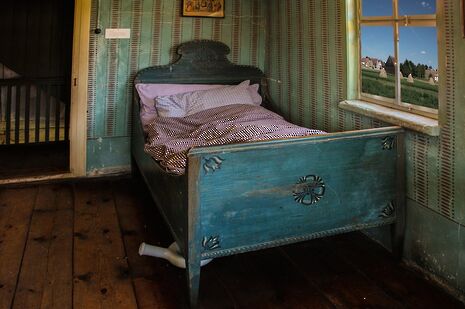Word Up: sleep tight
Georgie Thorpe considers why we might want to sleep tight, and how that won’t necessarily mean the bed bugs don’t bite

The end of term is drawing near and, with it, the chance to catch up finally with some of the sleep we’ve lost in the last eight weeks. The sleep will be welcome and, if we stick to traditional idiomatic expressions, it should also be ‘tight’. Maybe I’m alone in this, but it’s not an adjective I’d often use to describe how I’ve slept, so why do we always tell people to sleep tight?
A presenter on a show for the BBC announced in 2008, while examining an antique seat, that our phrase ‘sleep tight’ comes from the way in which mattresses used to be placed on the bed. Nowadays, beds tend to have boards or metal springs on which to place the mattress, but this wasn’t always the case. Originally, ropes would be pulled across the frame and the mattress supported by these. If the ropes weren’t kept tight enough, the mattress would sag and the bed wouldn’t be especially comfortable to sleep on, leading to a bad night’s sleep. According to Tim Wonnacott, the presenter in question, it was this practice that led to our telling people to ‘sleep tight’. There are a couple of problems with this theory, though. The first is that this style of bed is really old and hasn’t been used in centuries, well before the phrase is first recorded in 1866. As is the case so often, although this seems a sensible suggestion, there’s just too much of a time gap between the phenomenon and the phrase that has supposedly come from it. The other issue is that it doesn’t quite make sense to tell someone to sleep tight when it’s their bed that needs to be tight, not them. It might be a nice idea, but it seems Bargain Hunt wasn’t quite on the money this time.
“Bedbugs live inside mattresses, not in the sheets, so having tightly-stretched linen wouldn’t really do much to stop them”
Another suggestion comes from the extended version of this bedtime wish, ‘sleep tight and don’t let the bedbugs bite’. According to this theory, the longer phrase is the original one, which has just been cut down over time to simply ‘sleep tight’. The idea is that one might stretch bedsheets tightly over a mattress to prevent bedbugs from infesting the bed and getting to the sleeper. This would be a logical source for the phrase, were it not founded on several incorrect assumptions. Bedbugs live inside mattresses, not in the sheets, so having tightly-stretched linen wouldn’t really do much to stop them. On top of that, there aren’t any recorded uses of ‘sleep tight and don’t let the bedbugs bite’ until the mid-twentieth century, much later than the first citation of ‘sleep tight’ on its own. It’s more likely that ‘don’t let the bedbugs bite’ was added later, simply because it made sense and rhymed nicely, which doesn’t explain how we got ‘sleep tight’ in the first place.
Once again, there are some people who think this phrase might come from naval practices. Sailors would often sleep in slightly precarious berths or even hammocks, and if the passage got a bit bumpy, or someone was an energetic sleeper, there was a risk of falling out in the middle of the night. This theory states that sailors would wrap themselves up tightly in blankets, so that they’d move around less in their sleep and be at less of a risk of tumbling out of their beds, leading to the expression ‘sleep tight’. This one makes more sense than the others, as it’s the only theory in which it is people being described as being tight while asleep, but it’s also anachronistic. The days when conditions on ships were bad enough to warrant such wrapping well predate the phrase’s first appearance in 1866. Not only that, but this first recorded use comes in the diary of a woman called Susan Bradford Eppes, who doesn’t have any connection to sailing or anything naval. If it does come from a naval origin, it seems unlikely it would reach her early enough to make her the first person to publish it in print, making it even less probable that this is where the phrase comes from.
In fact, it’s probably all a lot more simple than that. ‘Tight’ is another word that has changed meaning over time, though not as drastically as some have. It used to mean something along the lines of ‘properly’ or ‘well’, and so ‘sleep tight’ was just a different way of telling someone to sleep well. It’s the same reason we say ‘fast asleep’ – ‘fast’ used to have a similar meaning to ‘tight’, and so the two phrases were born.
Sleep and the holidays may still seem at a distance, but at least the end is now in sight. Whatever else you get up to over Easter, I hope you enjoy the opportunity to have a few lie-ins, and that you can sleep more easily now that you know why we sleep tight
 News / Copycat don caught again19 April 2024
News / Copycat don caught again19 April 2024 News / Emmanuel College cuts ties with ‘race-realist’ fellow19 April 2024
News / Emmanuel College cuts ties with ‘race-realist’ fellow19 April 2024 Theatre / The closest Cambridge comes to a Drama degree 19 April 2024
Theatre / The closest Cambridge comes to a Drama degree 19 April 2024 News / Acting vice-chancellor paid £234,000 for nine month stint19 April 2024
News / Acting vice-chancellor paid £234,000 for nine month stint19 April 2024 Interviews / ‘People just walk away’: the sense of exclusion felt by foundation year students19 April 2024
Interviews / ‘People just walk away’: the sense of exclusion felt by foundation year students19 April 2024




